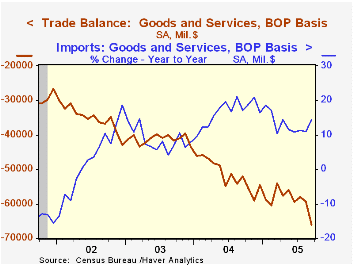 Global| Nov 10 2005
Global| Nov 10 2005Record U.S. Trade Deficit Suffered Triple Whammy
by:Tom Moeller
|in:Economy in Brief
Summary
The combination of higher oil prices, higher gasoline imports and lost aircraft exports due to the Boeing strike pushed the September U.S. foreign trade deficit deeper to a record $66.1B from a little revised $59.2B in August. [...]

The combination of higher oil prices, higher gasoline imports and lost aircraft exports due to the Boeing strike pushed the September U.S. foreign trade deficit deeper to a record $66.1B from a little revised $59.2B in August. Consensus expectations had been for less of a deepening to $61.0B.
Imports of goods & services surged 2.4% in September. Petroleum imports jumped another 4.4% (58.7% y/y) as the per barrel price of crude petroleum rose 8.9% to $57.32 (52.8% y/y) though the value of crude oil imports fell 7.0% due to refinery shutdowns following Hurricane Katrina. Offsetting that decline, however, was a nearly one quarter surge in the value of imports of fuel oil & gasoline.
Imports of nonpetroleum goods surged 2.4% (10.1% y/y) in September as foods, feeds & beverages jumped 4.1% (17.6% y/y) and industrial supplies & materials surged 6.2% (33.0% y/y) additionally reflecting a 30.0% spike in natural gas (88.05 y/y).
Capital goods imports also rose a strong 0.9% (8.8% y/y) as imports of advanced technology products jumped 3.7% (NSA, 11.0% y/y). Imports of nonauto consumer goods jumped 2.6 (10.7% y/y) though imports of autos, parts & engines fell 3.5% (+3.7% y/y).
Total exports collapsed 2.6% due to a 7.4% drop in capital goods exports, driven by the four-week strike at Boeing Co. which caused exports of civilian aircraft to drop $2.4B or 72.3% m/m. Also, exports of advanced technology products more than reversed all of the prior month's gain with a 7.9% drop (NSA, -0.8% y/y). Finally, Gulf port closings contributed to the 5.8% m/m decline in exports of foods, feeds & beverages though these declines were dampened by a 4.1% (12.3% y/y) rise in nonauto consumer goods exports.
Services exports surged 1.6% (10.9% y/y) due to a 1.8% (13.0% y/y) jump in private travel and a 3.0% (18.1% y/y) spike in "other" private transportation services.
The US trade deficit with China deepened sharply to a record $20.1B ($161.9B in 2004) due to a 4.2% (NSA, 26.8% y/y) surge in imports that was accompanied by a 17.8% drop in exports (NSA, +11.9% y/y). The US trade deficit with Japan again improved slightly m/m to $6.4B ($75.6B in 2004) while the monthly trade deficit with the Asian NICs deepened for the fifth consecutive month to $1.5B ($21.9B in 2004). The deficit with the European Union improved slightly to $10.1B ($109.3B in 2004) due to a 1.9% (3.5% y/y) gain in exports.
| Foreign Trade | Sept | Aug | Y/Y | 2004 | 2003 | 2002 |
|---|---|---|---|---|---|---|
| Trade Deficit | $66.1B | $59.3B | $51.9B (9/04) | $617.6B | $494.8B | $421.2B |
| Exports - Goods & Services | -2.6% | 1.5% | 7.7% | 12.6% | 4.6% | -3.0% |
| Imports - Goods & Services | 2.4% | 1.8% | 14.5% | 16.6% | 8.5% | 2.1% |
Tom Moeller
AuthorMore in Author Profile »Prior to joining Haver Analytics in 2000, Mr. Moeller worked as the Economist at Chancellor Capital Management from 1985 to 1999. There, he developed comprehensive economic forecasts and interpreted economic data for equity and fixed income portfolio managers. Also at Chancellor, Mr. Moeller worked as an equity analyst and was responsible for researching and rating companies in the economically sensitive automobile and housing industries for investment in Chancellor’s equity portfolio. Prior to joining Chancellor, Mr. Moeller was an Economist at Citibank from 1979 to 1984. He also analyzed pricing behavior in the metals industry for the Council on Wage and Price Stability in Washington, D.C. In 1999, Mr. Moeller received the award for most accurate forecast from the Forecasters' Club of New York. From 1990 to 1992 he was President of the New York Association for Business Economists. Mr. Moeller earned an M.B.A. in Finance from Fordham University, where he graduated in 1987. He holds a Bachelor of Arts in Economics from George Washington University.
More Economy in Brief
 Global| Feb 05 2026
Global| Feb 05 2026Charts of the Week: Balanced Policy, Resilient Data and AI Narratives
by:Andrew Cates






